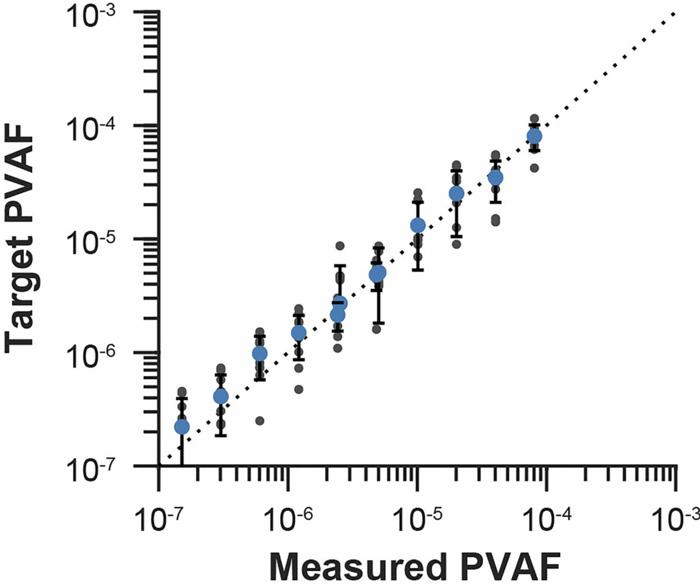In a groundbreaking advancement poised to reshape the landscape of hematologic oncology, researchers at Foresight Diagnostics have unveiled the analytical validation of a circulating tumor DNA (ctDNA) assay that leverages the novel PhasED-Seq technology. This cutting-edge technique demonstrates unprecedented sensitivity and specificity in detecting minimal residual disease (MRD) among patients afflicted with B-cell malignancies, potentially enabling clinicians to identify relapse risks far earlier than current diagnostic modalities.
As B-cell lymphomas remain among the most prevalent and clinically challenging blood cancers—including diffuse large B-cell lymphoma (DLBCL)—the quest for highly accurate, non-invasive monitoring tools is crucial. Conventional imaging methods and clinical evaluations often fall short when tasked with identifying minute quantities of residual malignant cells post-treatment, thereby hindering early intervention strategies. The PhasED-Seq assay targets this unmet clinical need by tracing complex phased variant patterns in tumor DNA fragments circulating within the bloodstream.
PhasED-Seq capitalizes on the principle of phased variants, a cluster of co-occurring mutations within a tumor DNA molecule, enhancing tumor specificity versus conventional single-mutation tracking assays. By enriching and sequencing these molecular signatures in cell-free DNA, the assay achieves an ultra-low background error rate of approximately 1.95×10⁻⁸, corresponding to fewer than two mutant molecules in every 100 million informative sequencing reads. This remarkable background suppression underpins its ability to detect cancer-derived DNA fragments with extraordinary precision.
The validation study encompassed an array of meticulously designed sample types, including plasma derived from healthy donors to assess assay specificity, dilution series contrived to evaluate sensitivity thresholds, and patient plasma specimens to benchmark clinical performance against existing MRD detection platforms. Of particular note, the assay could reliably detect fractional tumor DNA abundances below one molecule per million normal counterparts, demonstrating an analytical sensitivity that outperforms traditional techniques.
Integral to the assay’s robustness is its exceptional reproducibility. Repeated testing across diverse laboratory conditions preserved over 96% consistency, mitigating concerns regarding variability that often compromise liquid biopsy assays. Such reproducibility is paramount for eventual clinical adoption, ensuring that longitudinal patient monitoring reflects true biological changes rather than assay noise or technical artifacts.
In direct clinical comparisons, the PhasED-Seq assay displayed concordance exceeding 90% for positive MRD calls relative to established methods, while agreement on negative calls approached 78%. Importantly, discordant cases—where the new assay and comparator diverged—showed that PhasED-Seq results more faithfully mirrored clinical outcomes, including relapse occurrences and durable remissions. This superior clinical correlation underscores the assay’s potential to inform critical therapeutic decision-making.
The assay employs targeted sequencing panels designed to capture tumor-specific phased variant haplotypes, leveraging high-depth sequencing and sophisticated bioinformatics pipelines to discriminate true tumor-derived signals from background noise. This method benefits from the collective mutation context within a phased variant cluster, markedly elevating signal confidence and minimizing false positive detections that commonly plague ctDNA analyses.
By enabling earlier and more accurate identification of residual disease, the PhasED-Seq assay promises to shift the paradigm of lymphoma management. Clinicians could pinpoint patients harboring occult disease possessing elevated relapse risk despite ostensibly normal imaging findings, thus facilitating timely therapeutic intensification or maintenance strategies aimed at achieving durable remissions.
From a translational perspective, the study’s findings resonate with recent clinical guidelines advocating the incorporation of highly sensitive blood-based assays alongside imaging to comprehensively assess treatment response. The PhasED-Seq assay aligns perfectly with this evolving standard of care, offering a minimally invasive, scalable approach that circumvents the limitations inherent to radiologic or biopsy-based evaluations.
Beyond lymphoma, the methodological innovations introduced by PhasED-Seq lay a conceptual and technical foundation adaptable across multiple malignancies where ctDNA monitoring is clinically pertinent. The juxtaposition of enrichment strategies, phased variant detection, and stringent error suppression pioneers avenues toward next-generation liquid biopsy platforms capable of reshaping oncology diagnostics.
The assay’s capacity to resolve ctDNA signals at the molecular level with such precision reflects a confluence of advances in sequencing technologies, molecular biology, and computational analytics. Collectively, these components forge a powerful toolset for oncologists to surveil disease burden dynamically, tailor interventions based on molecular evidence, and potentially improve survival outcomes.
This analytical validation thus represents a critical milestone in precision oncology, converting complex genomic insights into actionable clinical assays. The PhasED-Seq-based MRD test heralds a new horizon where cancer treatment is informed by real-time, high-fidelity molecular surveillance, empowering healthcare providers to preempt disease relapse and optimize patient care pathways.
Subject of Research: Cells
Article Title: Analytical validation of a circulating tumor DNA assay using PhasED-Seq technology for detecting residual disease in B-cell malignancies
News Publication Date: 9-May-2025
Web References: http://dx.doi.org/10.18632/oncotarget.28719
Image Credits: Copyright: © 2025 Klimova et al. This is an open access article distributed under the terms of the Creative Commons Attribution License (CC BY 4.0)
Keywords: cancer, MRD, ctDNA, PhasED-Seq, CLARITY, residual disease
Tags: B-cell lymphoma monitoringcancer treatment monitoring toolscirculating tumor DNA assaydiffuse large B-cell lymphomaearly relapse identificationhematologic oncology advancementsminimal residual disease detectionnon-invasive cancer diagnosticsPhasED-Seq technologyprecision medicine in oncologytumor DNA mutation trackingultra-sensitive blood test





